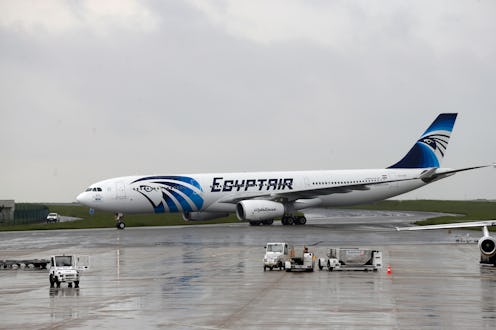News
What We Know About The Missing EgyptAir Flight
Late Wednesday night, EgyptAir flight 804 went off the radar over the Mediterranean Sea, prompting an intercontinental investigation and global intrigue into the missing plane. As the information has poured in over the last several days, a tentative narrative has emerged to explain the tragedy, which took the lives of 56 passengers and 10 crew members. Although the investigation is far from complete, what we know about the EgyptAir crash so far indicates that the investigation into the crash could continue for a long time.
The first step in most plane crash investigations is finding the plane's data transmitters, also known as black boxes, which relay information about the plane's last minutes before the crash and its final location. An Egyptian government source confirmed to CBS News on Saturday that the plane's black boxes had been found, but that confirmation is now contradicted by more recent news reports, which state that the search for the black boxes is still ongoing. The Egyptian government launched submarines on Friday in search of the black boxes and larger parts of the plane's fuselage that have also not yet been recovered. The U.S. Navy is supporting the search as well, and has salvaged over 100 pieces of wreckage from the crash, including some deflated life vests and passengers' luggage.
French officials confirmed that the plane's Aircraft Communications Addressing and Reporting System sent automatic alerts informing the ground crew of smoke inside the plane. A spokesman for the BEA, France's crash investigation agency, could not confirm the origin or cause of the smoke. David Learmount, editor of Flightglobal Magazine and an aviation industry leader, interpreted those signals as a sign that a fire started and spread quickly throughout the cabin of the plane. "The question now is whether the fire that caused the smoke was the result of an electrical fault — for example a short-circuit caused by damaged wiring — or whether some form of explosive or incendiary device was used," Learmount wrote on his website.
Officials have gone back and forth throughout their investigation debating the involvement of terrorism. Egyptian officials initially stated that terrorism might be a factor in the crash, but no group has yet come forward to claim responsibility (this doesn't necessarily mean a group won't eventually take credit for the crash — after last year's Russian plane crash in Egypt, ISIS did not claim responsibility for the crash for nearly three weeks.) However, French Foreign Minister Jean-Marc Ayrault told the crash victims' families on Saturday that "no theory" has been ruled out yet, so there might be more evidence to support terrorist involvement that has not been shared with the public.
Additional information is likely to surface as the investigation progresses, but that could take months, or possibly years (missing Malaysia Flight MH370 is still under investigation over two years after it crashed in March 2014.) The primary focus of the investigation going forward will likely be determining the cause of the crash, and whether or not it can be attributed to terrorism. As the investigation progresses, the cause will hopefully become clearer so that appropriate measures can be taken to protect passengers in the future.
